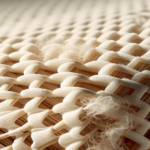Non-Toxic Sustainable Pillow Alternatives are designed using eco-friendly materials and processes, aiming to minimize environmental impact. These pillows are typically made from organic, biodegradable, or recycled materials such as organic cotton, recycled foam, or down alternatives. They cater to those who prioritize eco-conscious living and want their bedding to reflect that commitment.

Importance of Eco-Friendly Living in Your Sleep Environment
Choosing Non-toxic sustainable pillows is more than just a trend; it’s a crucial step in adopting eco-friendly habits at home. Since we spend nearly a third of our lives sleeping, the products we choose for our beds can have a significant impact on both our health and the planet. Non-Toxic Sustainable Pillow Alternatives reduce exposure to harmful chemicals, improve indoor air quality, and promote overall well-being.
Environmental Impact of Traditional Pillows
Traditional pillows, often filled with synthetic materials like polyester or polyurethane, are not biodegradable and contribute to landfill waste. These synthetic materials are derived from fossil fuels and are energy-intensive to produce. Furthermore, the chemicals used in the production process can off-gas harmful substances, contributing to indoor air pollution.
Over time, these pillows degrade into microplastics, which enter ecosystems and oceans, causing harm to wildlife and water quality.
What Makes a Pillow Non-Toxic Sustainable?
1. Use of Recycled and Renewable Materials
Sustainable pillows often incorporate materials like recycled foam, organic cotton, or natural latex. Organic cotton, for example, is grown without harmful pesticides and supports soil health. Recycled foam and down alternatives use materials that would otherwise end up in landfills, reducing the overall waste.

These materials are durable and offer similar comfort levels as traditional pillows but with a significantly lower environmental footprint.
2. Ethical and Eco-Friendly Manufacturing
Ethical production plays a crucial role in making pillows sustainable. Many eco-friendly pillow brands ensure that their manufacturing processes adhere to environmental and social responsibility standards. Certifications like GOTS (Global Organic Textile Standard) and OEKO-TEX assure consumers that their pillows are free from harmful chemicals and are produced in an environmentally conscious manner.
These certifications also ensure that workers are treated fairly, contributing to a more ethical production chain.
3. Zero Waste and Carbon-Neutral Production
Some brands are committed to producing zero-waste or carbon-neutral pillows. This means they actively reduce waste during manufacturing and offset any carbon emissions produced. For example, carbon-neutral pillows are made using energy-efficient processes, and the remaining emissions are compensated by supporting renewable energy or reforestation projects.
This approach helps reduce the overall carbon footprint of pillow production, aligning with global goals to combat climate change.
Types of Non-Toxic Sustainable Pillow Alternatives
1. Organic Cotton Pillows
Organic cotton pillows offer a range of benefits. They are naturally hypoallergenic, making them an excellent choice for those with allergies or sensitive skin. Since they are free from pesticides and synthetic chemicals, these pillows also contribute to a healthier sleep environment.
Additionally, organic cotton is biodegradable, ensuring it won’t harm the planet when it’s time to dispose of the pillow.

2. Recycled Material Pillows
Pillows made from recycled materials, such as foam or plastic bottles, are becoming increasingly popular. These pillows offer the same level of comfort and durability as traditional options but come with the added benefit of reducing waste. For example,
recycled foam pillows are created from post-industrial foam waste, diverting materials from landfills while still providing excellent support for your neck and head.

3. Biodegradable Pillows
For those looking to minimize their environmental impact even further, biodegradable pillows are an excellent choice. These pillows are made from materials that naturally break down over time, such as kapok fiber, buckwheat hulls, or latex derived from sustainable rubber tree plantations.
By choosing biodegradable pillow fillings, consumers ensure that once the pillow reaches the end of its life, it won’t contribute to landfill waste but instead return to the earth.
Non-Toxic Sustainable Pillow Certifications to Look For
1. GOTS (Global Organic Textile Standard)
The GOTS certification is one of the most trusted standards for organic textiles. It guarantees that the pillow is made from at least 70% organic fibers and ensures that the entire production process adheres to strict environmental and social criteria.
This certification is crucial for anyone looking to purchase organic cotton pillows, as it ensures the product is both eco-friendly and ethically made.
2. OEKO-TEX Certified Pillows
OEKO-TEX certification is another vital standard that ensures products are free from harmful chemicals. A pillow that carries this certification has been tested for over 100 harmful substances, providing peace of mind that it’s safe for both you and the environment.
It also assures that the production process meets high environmental standards, reducing the overall ecological footprint.
3. Cradle to Cradle Certification
Cradle to Cradle certified products are designed with the circular economy in mind, meaning they can be reused or recycled at the end of their life cycle. This certification is significant for biodegradable pillows, as it ensures that the pillow’s materials can safely return to the environment without causing harm.
It also promotes sustainable manufacturing processes that aim to eliminate waste altogether.
Top Sustainable Pillow Brands
Leading Brands Offering Sustainable Pillow Alternatives
When looking for eco-conscious sleep products, several brands stand out for their dedication to sustainability and ethical production. Here are a few trusted names that prioritize eco-friendly pillow options:
Table: Top Sustainable Pillow Brands
| Brand | Sustainable Practices | Key Products |
| Avocado Green | Organic cotton, GOLS-certified latex, and carbon-negative efforts | Avocado Green Pillow (organic latex and kapok) |
| Coyuchi | GOTS-certified, organic and renewable materials. | Organic Shredded Latex Pillow, Down Alternative |
| Brentwood Home | Recycled materials, plant-based fill, OEKO-TEX certifications. | Crystal Cove Pillow (charcoal-infused memory foam) |
| Boll & Branch | GOTS-certified cotton, ethical manufacturing. | Down Alternative Pillow (hypoallergenic fill) |
| Nest Bedding | Eco-friendly, made from recycled materials, and organic cotton. | Easy Breather Pillow (recycled memory foam) |
These brands emphasize not only eco-conscious production but also fair labor practices, reinforcing their reputability and trustworthiness in the sustainable bedding industry.
Ethical Manufacturing Practices in Pillow Production
Ethical pillow brands go beyond just using green materials. They also ensure that their production processes are socially and environmentally responsible. For example:
- Avocado Green maintains carbon-negative manufacturing by offsetting emissions through reforestation programs.
- Boll & Branch ensures their pillows are made by workers receiving fair wages, adhering to high social responsibility standards.
- Brentwood Home uses upcycled and natural materials in its pillows and follows zero-waste guidelines in its production.
Benefits of Non-Toxic Sustainable Pillow Alternatives
1. Health Benefits of Eco-Friendly Pillows
Sustainable pillows offer various health benefits, especially for individuals with allergies or sensitivities. The natural, hypoallergenic materials used in these pillows, such as organic cotton and kapok, prevent the accumulation of dust mites and other allergens. Moreover, the lack of toxic chemicals or synthetic fillers makes these pillows a safer choice for promoting better air quality in the bedroom.

● Hypoallergenic Sustainable Pillows: Organic cotton and natural latex are naturally resistant to allergens, reducing the risk of respiratory issues and skin irritations.
2. Environmental Benefits
Sustainable pillows drastically reduce waste by utilizing recycled materials like foam or plastic bottles and biodegradable components that decompose naturally over time. By choosing eco-friendly pillow options, you contribute to the reduction of non-recyclable waste and promote a greener lifestyle.
These pillows often come from companies committed to minimizing their carbon footprint and operating under a zero-waste policy.
Choosing the Right Non-Toxic Sustainable Pillow Alternatives for You
Best Pillow Types for Side Sleepers
Side sleepers generally need firmer pillows to support the neck and maintain spinal alignment. Sustainable pillow alternatives like those made from organic latex or shredded natural latex are ideal, offering both comfort and proper support.
- Example: Avocado Green Pillow (made from latex and kapok) provides firmness and is hypoallergenic, making it perfect for side sleepers.
Non-Toxic Sustainable Pillows for Back and Stomach Sleepers
Back and stomach sleepers tend to benefit from softer, less lofty pillows to maintain neck and spinal comfort. Eco-friendly pillows made from recycled down alternatives or biodegradable fibers work well for these sleeping positions.
- Example: Boll & Branch Down Alternative Pillow is soft yet supportive, making it suitable for back and stomach sleepers.
Caring for Non-Toxic Sustainable Pillow Alternatives
Washing and Maintenance Tips
To extend the life of your eco-friendly pillows, proper washing and care are essential. Organic cotton and recycled material pillows often come with specific care instructions to preserve their structure and sustainability.

● Organic Cotton Pillows:
Wash these pillows with cold water on a gentle cycle and use mild detergents to avoid breaking down the fibers. Air drying is preferable, but low-heat tumble drying is acceptable.
● Recycled Material Pillows:
Pillows made from recycled foam or plastic bottles are typically spot-cleaned. Always check manufacturer guidelines to ensure the materials maintain their durability and integrity.
● General Tip:
Regularly fluff and rotate your pillows to prevent uneven wear.
Pillow Recycling and Composting Programs
When it’s time to replace your eco-friendly pillows, consider recycling or composting options:
- Recycling: Many manufacturers or organizations offer pillow recycling programs, where old pillows can be repurposed into insulation, carpet padding, or animal bedding.
- Composting: For pillows with biodegradable filling (like organic cotton or wool), composting is a great way to return materials to the earth naturally.
Some notable recycling programs include TerraCycle, which works with brands to collect and recycle hard-to-recycle items like pillows.
Cost vs. Value: Are Sustainable Pillows Worth It?
1. Price Comparison of Non-Toxic Sustainable vs. Traditional Pillows
Sustainable pillows generally come with a higher initial cost compared to conventional pillows. However, the long-term benefits, both in terms of health and durability, make them a worthy investment. Organic cotton, natural latex, and recycled foam pillows often last longer due to their quality materials, making them cost-effective over time.
- Example: An organic cotton pillow may cost around $80–$120, while a synthetic fiber pillow might be $20–$40. But the sustainable option will likely last much longer.
2. Ethical Investment in Your Sleep
Choosing eco-friendly pillows isn’t just about comfort; it’s also about making an ethical investment in the environment. By opting for sustainable products, you’re reducing your carbon footprint, supporting ethical labor practices, and promoting a healthier sleep environment.
- Long-lasting Comfort: Sustainable pillows often maintain their comfort level for a longer time because of the high-quality, natural materials used.
Conclusion
Switching to non-toxic sustainable pillow alternatives is an important step toward reducing your environmental footprint while improving your personal well-being. With eco-friendly materials, ethical manufacturing processes, and a focus on long-term value, these pillows offer a win-win solution for both you and the planet.
Make the choice today to invest in your health and the environment by choosing sustainable, ethical pillows that promote a better tomorrow.
More to Explore:
Bamboo Pillow
Natural Latex Pillows
Organic Cotton Pillows
Recycled Material Pillows
FAQs:
What are non-toxic sustainable pillows made of?
Non-Toxic Sustainable Pillow Alternatives are made from eco-friendly materials such as organic cotton, recycled foam, natural latex, wool, or materials derived from recycled plastic bottles. These materials reduce environmental harm and support sustainability by using renewable or recycled resources.
Are sustainable pillows good for allergies?
Yes, many non-toxic sustainable pillow alternatives, particularly those made from organic materials like cotton or wool, are hypoallergenic. They are free from harmful chemicals, pesticides, and synthetic materials, making them ideal for people with allergies or sensitivities.
How long do eco-friendly pillows last?
Sustainable pillows can last as long as, or longer than, traditional pillows, usually around 3-5 years. Their lifespan depends on the type of material and how well they are maintained. Organic cotton and natural latex tend to be more durable when properly cared for.
Are non-toxic sustainable pillows worth the cost?
While non-toxic sustainable pillow alternatives often come at a higher initial cost, they offer long-term benefits such as durability, health benefits (due to chemical-free materials), and reduced environmental impact. Their extended lifespan and ethical production can justify the investment.
How do you recycle old pillows?
Many companies offer pillow recycling programs, where pillows can be repurposed for uses like insulation or animal bedding. For biodegradable pillows, composting is also an option. It’s essential to check local recycling guidelines or return the pillow to the manufacturer if they have a recycling program.
Are recycled pillows as comfortable as traditional pillows?
Yes, recycled pillows can be just as comfortable as traditional pillows. Recycled foam and other materials are often designed to mimic the softness, support, and durability of conventional pillow fillings.
Can non-toxic sustainable pillows help with allergies?
Yes, many non-toxic sustainable pillow alternatives are made from hypoallergenic materials, such as organic cotton or natural latex, which are resistant to dust mites and other common allergens.

















[…] only is this approach eco-friendly, but it also offers the rewarding experience of contributing to sustainability in meaningful ways. When you take the time to recycle your old buckwheat hull-filled Body Prop or […]